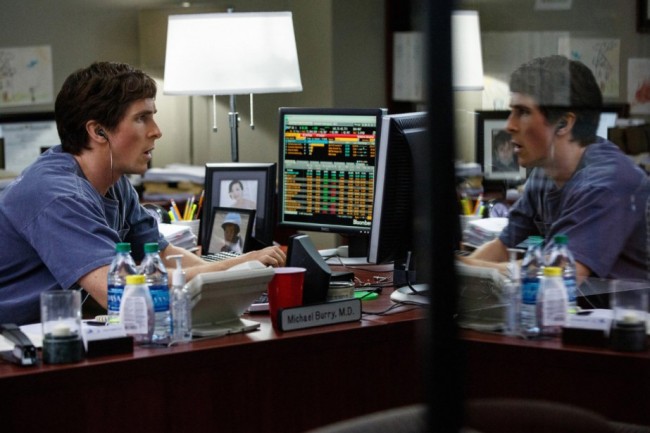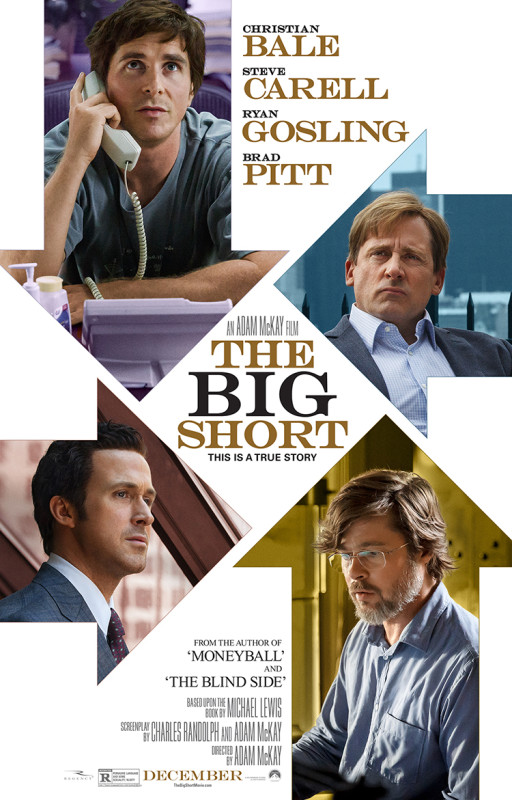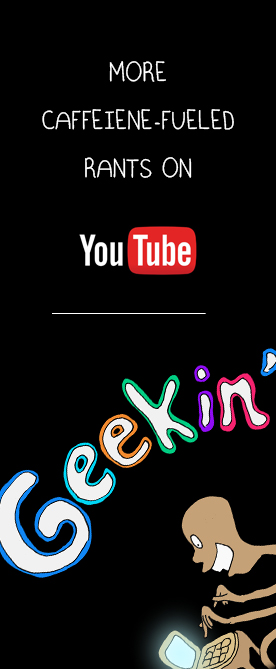By James Hancock December 10th, 2015
I am very confident in my ability to talk film but when it comes to finance, in particular the financial crisis that the world endured in 2008, my confidence could not be more fragile. So before getting into my review of Adam McKay’s new movie, The Big Short, I have to apologize in advance for all the times where I will likely be butchering any of the financial terminology that has kept me scratching my head for the last seven years. Based on the nonfiction book by Michael Lewis, The Big Short (which I pretended to read but only got through a few chapters), the movie follows the story of several investors who saw the signs of imminent economic collapse and risked their money and their reputations on betting against the housing market and in essence, the US economy. If you’ve never read Michael Lewis, he’s had an incredibly successful career as an author and journalist tackling a wide array of topics such as completely rethinking how to manage a baseball franchise in Moneyball: The Art of Winning an Unfair Game. He’s an expert at fleshing out how unconventional thinkers build strategies that seem obvious in hindsight after the fact but often make these iconoclasts the object of ridicule before their theories bear fruit. In the case of this story, we have a few men who refuse to believe the assumption that the housing market will always go up especially since the underlying assets were completely rotten to the core. But as we get to know our protagonists and root for their inevitable success, we have an unusual situation where victory for the central characters means disaster for the rest of the world which includes me, anyone reading this review or anyone watching the movie. We essentially get to watch our demise in slow motion through the eyes of the only people skeptical enough to see it coming. Christian Bale, Ryan Gosling, Steve Carrell & Brad Pitt each play characters on different parts of the ethical spectrum giving us a wide range of different narratives to sink our teeth into as this morbid yet fascinating drama unfolds. I applaud Adam McKay for venturing outside of his comfort zone. After all, this is the man who gave us Anchorman: The Legend of Ron Burgundy (2004), an admittedly funny movie but not exactly the perfect grooming for a film that explores arguably the most significant historical event of the 21st century. That said, Adam Mckay for the most part succeeds at creating a film that is both informative and entertaining with a minimum of the obligatory sanctimonious sermonizing one would expect from such a story seven years after the most severe financial collapse since the Great Depression.
I was in business school from 2006-2008 and graduated just in time to look for a job amidst the confusion and panic that dominated most of 2008. The fact that I had moved to New York that summer only made the financial crisis all the more vivid with my front row seat for the action. The only thing that saved me from total panic myself is that I happen to suck at finance. I barely survived the finance courses I was required to take as part of the core curriculum for earning my MBA, so in a way my ignorance saved me from the emotions I should have been feeling as institutions like Bear Stearns and Lehman Brothers went down in flames. I can’t really explain the mechanics behind a mortgage backed security nor can I convincingly articulate what the hell a credit default swap is without the help of the internet. Luckily, the movie The Big Short does an excellent job of explaining these mysteries without sacrificing the entertainment value of the movie. When it is time to explain about subprime mortgages, the film cuts to Margot Robbie, playing herself, sitting in a bubble bath with a glass of champagne to tell us that a subprime mortgage is basically a shit loan given to someone with poor credit history. When defining a collateralized debt obligation, Anthony Bourdain shows up to compare these pooled debts with a pile of 3-day old fish being chopped up and served in a stew as if the fish were fresh. If you’re interested in the financial crisis, this film will provide you with all the information you want and more. I must confess that I frequently lost the thread of many conversations when I could not keep up with the terminology but never once did I find my attention drifting. The acting on display is pretty impressive across the board and those few characters who are not quite as engaging luckily have very little screen time.
What this movie does best is unveil how from the wealthiest Wall Street CEO down to the strippers flipping houses in Florida, we were all part of the systemic greed, incompetence, corruption, stupidity and in many cases fraudulent and criminal behavior that led to a crisis from which the world has not yet fully recovered. You will frequently find yourself shocked at how easily Standard & Poor’s was willing to hand out AAA bond ratings to worthless financial products or how limited or unwilling the SEC was willing to investigate criminal behavior with so many of their employees looking to make the switch to high paying gigs in the very same banks that they were ostensibly responsible for investigating. Even more alarming is the finale where we see just how little has changed in the aftermath and that the people who suffered most were those least involved. In order to prevent a total collapse, we saw our tax dollars used to bail out irresponsible institutions who had made enormous bets they could never afford if their prevailing theories about the housing market ever proved to be wrong. This is an inexhaustible topic that historians will be studying and debating for decades to come and of all the movies made so far on this topic including Too Big to Fail (2011) and Margin Call (2011), this is the most interesting to me. While on a few occasions the drama falls flat or the plot becomes incoherent, I thoroughly enjoyed the movie overall and will definitely be revisiting the film if only to try and make sense of the most turbulent and unpredictable period I’ve ever lived through.
I am one of the Co-Hosts of Wrong Reel and you can find more of our content here:
Join the Conversation on Twitter







